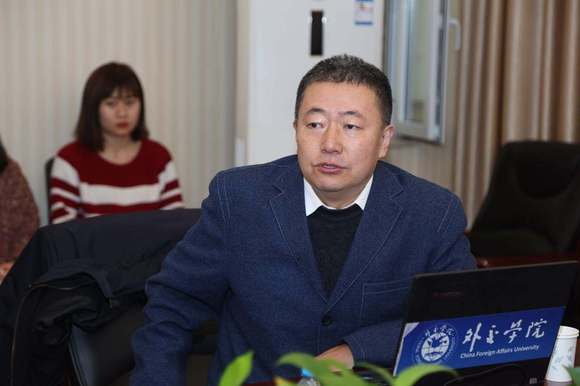 |
|
Professor Zhou Yongsheng of China Foreign Affairs University
|
Chinese state media says US should offer more corresponding measures for Yongbyon shutdown
According to Professor Zhou Yongsheng of China Foreign Affairs University on the Pyongyang Declaration released on Sept. 19, “The declaration represents the start of the legal termination of the war between North and South Korea,” and judged that “South Korea will play an increasingly important part in this process in the days to come.” The Chinese state media were largely in agreement that, as much as North Korea had expressed a willingness to shut down the nuclear facilities in Yongbyon, so too should the US put forward equivalent measures corresponding to such a move. Professor Zhou, an expert on East Asian affairs at the China Foreign Affairs University, an institute for the education of China’s foreign diplomats, said that through these talks, the inter-Korea summit “made a huge step towards peace on the Korean Peninsula, by agreeing to move away from the threat of war and hostile relations, and proposing concrete measures to this end.” He added, “While the Pyongyang Declaration does not have the binding force of a treaty that is ratified by a body of lawmakers, it is nonetheless an international document that represents an agreement between two governments, with a certain level of legal validity according to the precepts of international law. The declaration represents the [effective] start of the termination of the Korean War by South and North Korea.” The crucial role of South Korea in continuing to mediate NK-US negotiations Professor Zhou went on to emphasize that as North Korea had demonstrated an intention to denuclearize, expressing a willingness to permanently dismantle the nuclear facilities in Yongbyon, the US should make a concession corresponding to this move, and stressed that South Korea, for its part, should take on a more active role. He said that “the Declaration itself has an aspect that urges action on the part of the US. Through dialogue with the US, South Korea must prompt the US to make policy concessions of its own towards denuclearization on the Korean Peninsula. South Korea’s role is crucial.” US-China conflict rules out China’s role in ending Korean War However, Professor Zhou judged it unlikely that the US and China, currently engaged in a trade war, would come to any agreement of their own regarding the North Korean nuclear issue. Intense pressure from the US on China has largely ruled out the possibility of cooperation from China, as seen last year at the height of the North Korean nuclear crisis, when China and the US cooperated in the United Nations Security Council. According to Professor Zhou, “While China will continue to impose the current sanctions, it will be difficult for China to continue taking an active role.” And while Professor Zhou acknowledged that China’s participation was not necessary in a political statement to terminate of the war, like the Pyongyang Declaration, he stressed that for a total transition to peace, China’s participation was absolutely essential. In that sense, he said that a statement for the termination of the Korean War that only involved North and South Korea and the US, excluding China, could never be complete. The Chinese state media unanimously welcomed the Pyongyang Declaration and urged the US to make concessions of its own. The People’s Daily, the official newspaper of the Chinese Communist Party, in a column published Sept. 20, stated, “The denuclearization process of the Korean Peninsula can only happen through joint action. North Korea has proposed the conditions for the next step towards denuclearization in the joint declaration between the two Koreas,” and argued that the US should now enact measures corresponding to such a step. Chinese state newspaper The China Daily also published an op-ed that argued that “The Pyongyang Joint Declaration has made it clear that the ball in now in the US court. The US must think seriously about the symbolism of its role in maintaining the war on the Korean Peninsula, and carefully consider how Pyongyang will act moving forward.” “It is a blessing for all people of the [Korean] peninsula and the wish of the people, including those of China. We sent our enthusiastic congratulations and firm support,” Chinese Foreign Minister Wang Yi said the same morning of the Pyongyang Declaration. “It is a supremely great thing and a truly great achievement that [South and North Korea] are working together to achieve full-scale improvement and development in their relationship and to turn the Korean Peninsula into a garden of peace free from nuclear weapons and military threats,” he added. “All countries must take action, working individually toward this goal,” he stressed. Noting that this year marks the 65th anniversary of the armistice agreement’s signing, Wang added, “Peace is slowly coming. We must not miss this rare opportunity for peace.” By Kim Oi-hyun, Beijing correspondent Please direct comments or questions to [english@hani.co.kr]






